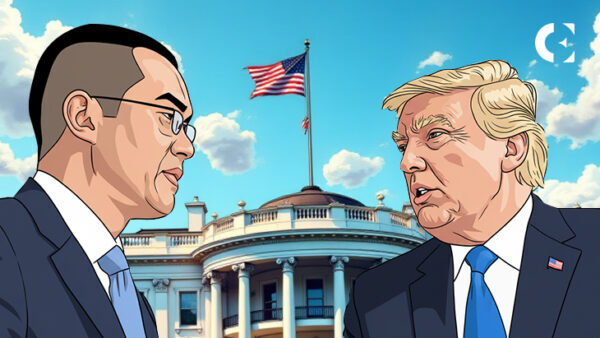- Binance founder CZ addresses backlash over Trump pardon, framing vocal critics as “SBF supporters.”
- Rep. Maxine Waters condemned the pardon, alleging corruption, WLFI ties, and poor timing (during shutdown).
- Controversy highlights stark political divide over crypto, Trump’s actions, and CZ’s original offense.
Binance founder Changpeng “CZ” Zhao has publicly addressed the growing criticism surrounding his recent presidential pardon by U.S. President Donald Trump.
In a post shared on X, Zhao said that “the people who are aggressive against me were all SBF supporters… Gary Gensler, Elizabeth Warren, and…” referring to figures who had previously supported FTX founder Sam Bankman-Fried.
His defensive maneuver comes as prominent lawmakers, led by Representative Maxine Waters, issued scathing condemnations of Trump’s decision.
Related: Crypto Market Divided: Was CZ’s Pardon ‘Obvious’ or a Case of Insider Advantage?
Waters Condemns Pardon: Accuses Trump of Aiding “Crypto Criminals” During Shutdown
Congresswoman Maxine Waters, the ranking Democrat on the House Financial Services Committee, released a statement criticizing the pardon. She said Trump’s decision “effectively legitimized” the offenses Zhao was convicted of in 2023, which included enabling money laundering and facilitating illicit transactions.
Related: Congresswoman Maxine Waters Fights “Corrupt” Crypto Bills Tied to Trump
Waters noted that the move came during a government shutdown, when federal employees remained unpaid and essential public services were disrupted. She accused the president of prioritizing “crypto criminals who have helped line his pockets” over the welfare of American workers.
Allegations Mount: Waters Claims CZ Funneled Billions to Trump’s WLFI
Waters went further, directly alleging a quid pro quo involving significant financial ties. She claimed Zhao had engaged in extensive lobbying for the pardon and asserted that the Binance founder maintained financial connections with Trump’s digital asset company, World Liberty Financial (WLFI).
Related: WLFI Token Jumps 14% as Market Links Price Pump to Trump’s Pardon of CZ
According to Waters’ statement, Zhao allegedly “funneled billions” into Trump’s venture. While offering no immediate proof for this specific claim, the accusation explicitly links the pardon to potential financial influence peddling between CZ, Binance, and the President’s business interests, escalating the controversy significantly.
CZ’s Defense Tactic: Framing Critics as Discredited “SBF Supporters”
CZ’s response sidestepped directly addressing Waters’ specific financial allegations. Instead, he employed a broader counter-attack strategy: painting his most vocal critics, specifically naming Senator Warren and implicitly including figures like Waters and SEC Chair Gensler, as hypocrites due to their perceived past support or less critical stance towards Sam Bankman-Fried before FTX’s collapse.
By labeling them “SBF supporters,” CZ attempts to undermine their credibility on crypto matters, suggesting their current attacks are politically motivated or stem from a flawed judgment history, rather than genuine concern over his own case or the pardon itself. This tactic aims to shift the narrative away from the facts of his settlement and the pardon’s implications.
Context Revisited: The Compliance Charge Behind CZ’s Conviction and Pardon
It’s crucial to recall the specifics of CZ’s legal situation. He pleaded guilty in 2023 not to direct money laundering, but to violating the U.S. Bank Secrecy Act by failing to implement and maintain an effective anti-money laundering (AML) program at Binance. This distinction is central to the factual dispute highlighted in CZ’s earlier responses to Senator Warren.
While Binance did facilitate illicit transactions due to these compliance failures (leading to the $4.3 billion settlement), CZ’s personal conviction and four-month sentence were tied to the failure of oversight, not direct participation in laundering funds.
Trump’s pardon wipes away this specific conviction, reigniting debate over whether the punishment fit the crime and whether the clemency serves justice or political expediency.
Disclaimer: The information presented in this article is for informational and educational purposes only. The article does not constitute financial advice or advice of any kind. Coin Edition is not responsible for any losses incurred as a result of the utilization of content, products, or services mentioned. Readers are advised to exercise caution before taking any action related to the company.







